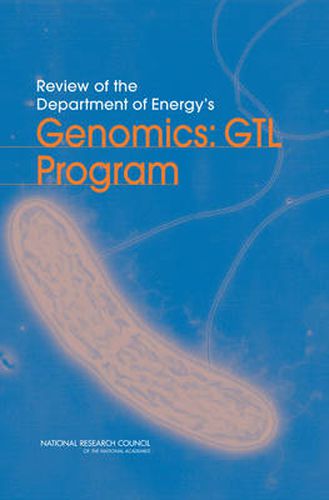Readings Newsletter
Become a Readings Member to make your shopping experience even easier.
Sign in or sign up for free!
You’re not far away from qualifying for FREE standard shipping within Australia
You’ve qualified for FREE standard shipping within Australia
The cart is loading…






The U.S. Department of Energy (DOE) promotes scientific and technological innovation to advance the national, economic, and energy security of the United States. Recognizing the potential of microorganisms to offer new energy alternatives and remediate environmental contamination, DOE initiated the Genomes to Life program, now called Genomics: GTL, in 2000. The program aims to develop a predictive understanding of microbial systems that can be used to engineer systems for bioenergy production and environmental remediation, and to understand carbon cycling and sequestration. This report provides an evaluation of the program and its infrastructure plan. Overall, the report finds that GTL&s research has resulted in and promises to deliver many more scientific advancements that contribute to the achievement of DOE&s goals. However, the DOE&s current plan for building four independent facilities for protein production, molecular imaging, proteome analysis, and systems biology sequentially may not be the most cost-effective, efficient, and scientifically optimal way to provide this infrastructure.As an alternative, the report suggests constructing up to four institute-like facilities, each of which integrates the capabilities of all four of the originally planned facility types and focuses on one or two of DOE&s mission goals. The alternative infrastructure plan could have an especially high ratio of scientific benefit to cost because the need for technology will be directly tied to the biology goals of the program.
$9.00 standard shipping within Australia
FREE standard shipping within Australia for orders over $100.00
Express & International shipping calculated at checkout
The U.S. Department of Energy (DOE) promotes scientific and technological innovation to advance the national, economic, and energy security of the United States. Recognizing the potential of microorganisms to offer new energy alternatives and remediate environmental contamination, DOE initiated the Genomes to Life program, now called Genomics: GTL, in 2000. The program aims to develop a predictive understanding of microbial systems that can be used to engineer systems for bioenergy production and environmental remediation, and to understand carbon cycling and sequestration. This report provides an evaluation of the program and its infrastructure plan. Overall, the report finds that GTL&s research has resulted in and promises to deliver many more scientific advancements that contribute to the achievement of DOE&s goals. However, the DOE&s current plan for building four independent facilities for protein production, molecular imaging, proteome analysis, and systems biology sequentially may not be the most cost-effective, efficient, and scientifically optimal way to provide this infrastructure.As an alternative, the report suggests constructing up to four institute-like facilities, each of which integrates the capabilities of all four of the originally planned facility types and focuses on one or two of DOE&s mission goals. The alternative infrastructure plan could have an especially high ratio of scientific benefit to cost because the need for technology will be directly tied to the biology goals of the program.